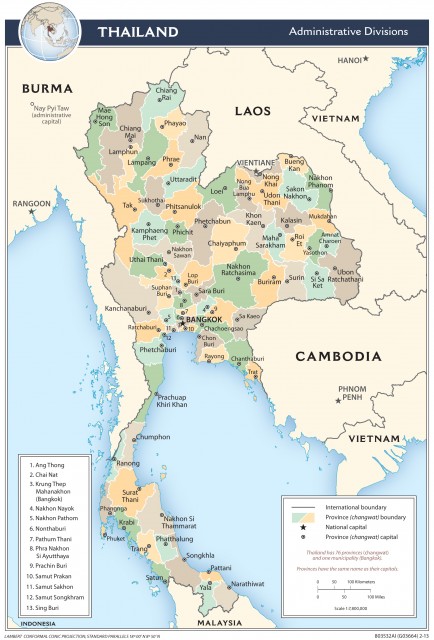Thailand
Area 319,385 square mi (514,000 square km)
Population 67.73 million 2014
Capital Bangkok
Highest Point 8,451 ft (2,576 m)
Lowest Point 0 m
GDP $404.8 billion 2014
Primary Natural Resources tin, rubber, natural gas, tungsten, timber.
THE KINGDOM OF Thailand, a Southeast Asian country, is bordered by MYANMAR (Burma) to the west, LAOS to the north and northeast, and CAMBODIA to the southeast. To the south lies the Gulf of Siam, where oil is drilled, and to the southwest is the Andaman Sea, a part of the BAY OF BENGAL.
Thailand's Mon kingdom of the early Christian era was overpowered by the Mekong delta-based Funan kingdom by the 6th century, but the Mons regained their power by 550. The Mons and all the later Thai kingdoms were based in the Chao Phraya river (main river of the country) valley and delta. Thailand became a vassal of Cambodia-based Angkor kingdom between 1223 and 1322.

Thereafter, the Thai kingdom of Ayutthaya (1350–1767) emerged, which moved its capital to Thonburi and then to Bangkok in 1782, both located by the side of Chao Phraya River. Thailand is the only country in Southeast Asia that has not been colonized by any Western power. Western modernization was welcomed by the king by the late 19th century with (a) construction of roads/railroads and telegraph services, (b) introduction of scientific education, and (c) abolition of slavery.
Today, Thailand has 2,448 mi (3,940 km) of railroads and 27,674 mi (44,534 km) of roads. Its wet-dry monsoon climate, with rains in the summer and temperature highs of 100 degrees F (37.8 degrees C), allows wet-rice cultivation, particularly in the delta, which, being in the rain-shadow, receives inadequate rainfall and therefore has developed a network of irrigation canals dating from several centuries ago. Irrigation and the large-scale introduction of a hybridseed-based green revolution since the 1970s have turned Thailand into a leading rice surplus and rice-exporting country; 54 percent of the Thai labor force is engaged in agriculture.
Thailand's forests are known for timber, particularly teak, but overcutting forced the government to ban timbering in 1988. A replanting program has been started. Apart from some petroleum, rubies and sapphires are found in the country. It is the second- and third-largest world producer of tungsten and tin, respectively. Thailand's free market economy is friendly to foreign investment. Many transnational companies have established factories in Thailand, taking advantage of cheap labor. Exports also include computers and electrical appliances. During the 1985–95 period, the country registered its highest growth rate, about 9 percent annually. After a downturn as a result of increased speculative pressure in the Thai currency in 1997, the economy has started to revive with a gross domestic product growth rate of 5.2 percent in 2002.
The population of Thailand is growing at a slow rate of 0.95 percent (2003); four-fifths live in rural areas. Bangkok has been given a designation of “sex capital of the world,” as tourists visit the city to be served by sex workers. In the process, an increasing number of local people in Thailand get infected by and die of AIDS. In 2001, 670,000 people were living with HIV/AIDS virus with prevalence rate of 1.8 percent.
Thailand's major language is Thai; English is the secondary language of the elite. Theravada Buddhists are 95 percent of the total population. Thai (75 percent) and Chinese (14 percent) are the major ethnic groups. There is a thriving China Town in the capital of Bangkok, which is a primate city of 10.3 million (2000). The area around the capital is the most densely populated in the country. Bangkok sets the political leadership and standard of behavior for the rest of the country.